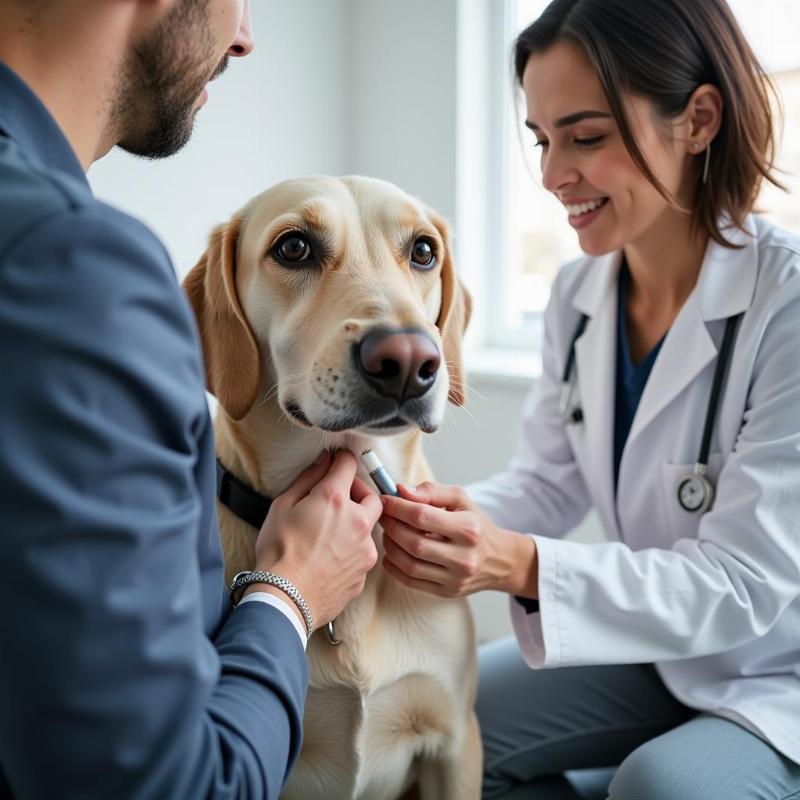Unexplained weight loss in your senior dog can be concerning. Is it just a natural part of aging or something more serious? Understanding the reasons behind weight loss in older dogs is crucial for ensuring their continued health and well-being. This article explores the common causes of weight loss in senior dogs, helping you determine when it’s time to consult your veterinarian and what steps you can take to support your furry friend.
Common Causes of Weight Loss in Senior Dogs
Several factors can contribute to weight loss in older dogs. Some are relatively benign, while others can signal a serious underlying health condition. Let’s delve into the most common culprits:
Dental Issues
As dogs age, dental problems become more prevalent. Painful teeth and gums can make chewing difficult, leading to decreased food intake and subsequent weight loss. Regular dental checkups and cleanings are vital for senior dogs.
Reduced Appetite
A decrease in appetite can be caused by various factors, including changes in taste and smell, medication side effects, and even stress or anxiety.
Digestive Problems
Conditions like inflammatory bowel disease (IBD), exocrine pancreatic insufficiency (EPI), and even food allergies can interfere with nutrient absorption, resulting in weight loss despite a normal appetite.
Metabolic Diseases
Diabetes, hyperthyroidism, and kidney disease are common metabolic disorders in older dogs that can cause significant weight loss. These conditions disrupt the body’s ability to process nutrients effectively.
Cancer
Unfortunately, cancer is a more frequent occurrence in older dogs and can lead to weight loss due to various factors, including decreased appetite, metabolic changes, and the tumor’s energy demands.
Cognitive Decline
Similar to humans, dogs can experience cognitive decline as they age, sometimes referred to as “doggy dementia.” This can affect their eating habits, leading to forgetting to eat or becoming disoriented and unable to find their food bowl.
When to Contact Your Veterinarian
Any unexplained weight loss in your senior dog warrants a visit to the veterinarian. While some causes might be minor, it’s essential to rule out any underlying medical conditions. Be prepared to provide your vet with a detailed history of your dog’s weight loss, including when it started, how much weight they’ve lost, and any other accompanying symptoms.
 Bác sĩ thú y khám chó già
Bác sĩ thú y khám chó già
Supporting Your Senior Dog’s Health
Maintaining a healthy weight is crucial for your senior dog’s overall well-being. Here are some tips to support their health:
- Regular Veterinary Checkups: Schedule regular checkups with your veterinarian, ideally every six months, to monitor your senior dog’s health and address any potential issues early on.
- Dental Care: Prioritize regular dental cleanings and at-home dental care to prevent dental disease, which can impact appetite and nutrient intake.
- Nutritious Diet: Feed your senior dog a high-quality, age-appropriate diet that meets their specific nutritional needs. Your vet can recommend suitable food options.
- Portion Control: Monitor your dog’s food intake and adjust portions as needed to maintain a healthy weight.
- Exercise: Regular, gentle exercise is essential for senior dogs to maintain muscle mass, improve digestion, and support overall health.
- Mental Stimulation: Provide mental enrichment through activities like puzzle toys and short training sessions to keep your senior dog engaged and stimulated.
Conclusion
Weight loss in older dogs can be a complex issue with various underlying causes. By understanding the potential reasons and seeking timely veterinary care, you can help ensure your senior dog remains healthy, happy, and enjoys their golden years to the fullest. Remember, proactive care and a strong partnership with your veterinarian are key to managing weight loss and maintaining your senior dog’s quality of life.
FAQs
- Is weight loss a normal part of aging in dogs? While some slight weight fluctuations can occur, significant or unexplained weight loss is not a normal part of aging and should be investigated by a veterinarian.
- What are the signs of dental pain in dogs? Signs of dental pain can include reluctance to eat, drooling, pawing at the mouth, and bad breath.
- How can I encourage my senior dog to eat? Try warming their food slightly, offering smaller, more frequent meals, or adding a small amount of low-sodium broth to their food.
- What are the first steps I should take if I notice my dog is losing weight? Schedule an appointment with your veterinarian to discuss the weight loss and any other accompanying symptoms.
- How can I manage my dog’s weight loss if they have a chronic illness? Work closely with your veterinarian to develop a tailored plan that addresses the underlying condition and supports your dog’s nutritional needs.
- What are some high-quality food brands for senior dogs? Your veterinarian can recommend specific brands based on your dog’s individual needs and health status. Consider brands that offer specialized senior formulas.
- How often should I take my senior dog for a checkup? It is generally recommended to take senior dogs for checkups every six months.
Further Reading on Beautdogs.us
- Senior Dog Care Guide
- Understanding Dog Nutrition
- Common Health Issues in Older Dogs
Beautdogs.us: Your Trusted Source for Dog Care
Beautdogs.us is your go-to resource for comprehensive dog care information in the United States. We provide expert guidance on various dog breeds, along with in-depth knowledge of health care, nutrition, and training. Our platform offers practical advice on responsible pet ownership, including legal matters and financial planning. Whether you’re a new dog owner or a seasoned pro, Beautdogs.us is your one-stop destination for all things canine. When you need assistance, contact us via Email: [email protected] for detailed and accurate answers.